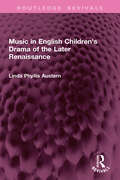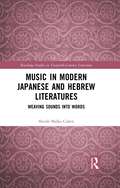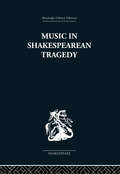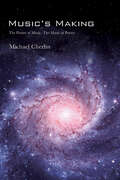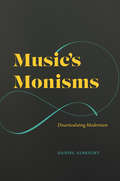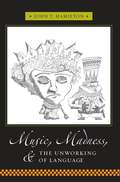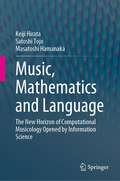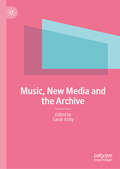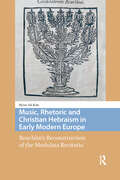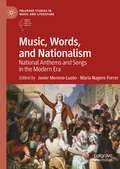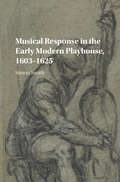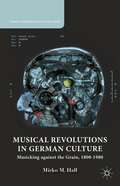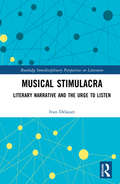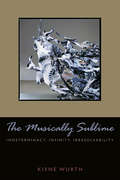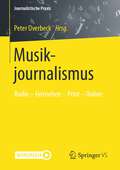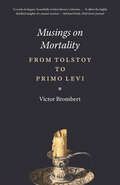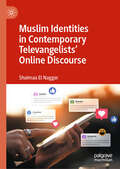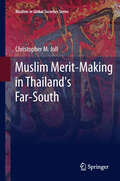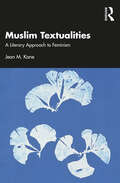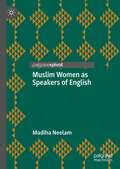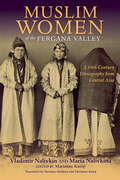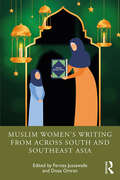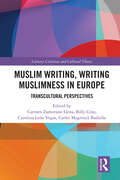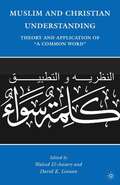- Table View
- List View
Music in English Children's Drama of the Later Renaissance (Routledge Revivals)
by Linda Phyllis AusternOriginally published in 1992, Music in English Children’s Drama of the Later Renaissance is the first book-length study to examine the Elizabethan and Jacobean children’s drama, not only from a musicological perspective, but also drawing on the histories of literature, culture, and the theater. It gives the children’s companies new historical significance, showing that they were an integral and ultimately influential part of the London theatrical world. These companies originated important features of later drama, such as music before and between acts, and the exploitation of different timbres for specific effects.Those interested in music history, English literature, theater history, and cultural history will find this a comprehensive and fascinating study. Of special note are the appendices, which offer a unique and important reference source by providing the only definitive list of the plays and songs used by the children.
Music in Modern Japanese and Hebrew Literatures: Weaving Sounds into Words (Routledge Studies in Twentieth-Century Literature)
by Shirah Malka CohenMusic in Modern Japanese and Hebrew Literatures examines the place of classical music in early 20th-century Japanese and Hebrew literatures. As this book shows, both Japanese and Hebrew writers of the period made use of Western classical music in their novels and short stories in order to explore issues of belonging, cultural and literary identity, and artistic integrity. Hence, by analysing the appearance of such music in the writing of Japanese writers, such as Nagai Kafū, Shiga Naoya and Uchida Hyakken, and Hebrew writers, such as Leah Goldberg, Gershon Shofman, and Ya’akov Horowiz, this book sets an intriguing narrative of writers’ interaction with a modernizing world and their struggles to make sense of multitudes of cultural influences. Through such struggles, these Japanese and Hebrew writers created unique visions of literature that constitute, this book argues, a cosmopolitan literary sphere. In looking into these matters, this book aims to recontextualize the place of Japanese and Hebrew literatures of the early 20th century in relation to each other as well as European culture and to create a new and exciting approach to the study of World Literature.
Music in Shakespearean Tragedy
by F W SternfeldFirst published in 1963. When originally published this book was the first to treat at full length the contribution which music makes to Shakespeare's great tragedies, among them Hamlet, Othello, and King Lear. Here the playwright's practices are studied in conjunction with those of his contemporaries: Marlowe and Jonson, Marston and Chapman. From these comparative assessments there emerges the method that is peculiar to Shakespeare: the employment of song and instrumental music to a degree hitherto unknown, and their use as an integral part of the dramatic structure.
Music in the Georgian Novel
by Pierre DuboisMusic was an essential aspect of life in eighteenth-century Britain and plays a crucial role in the literary strategies of Georgian novels. This book is the first to investigate the literary representation of music in these works and explores the structural, dramatic and metaphorical roles of music in novels by authors ranging from Richardson to Austen. Pierre Dubois explores the meaning of 'musical scenes' by framing them within contemporary cultural issues, such as the critique of Italian opera or the theoretical shift from mimesis to the alleged autonomy and mystery of music. Focusing upon both eighteenth-century theories of music, and the way specific musical instruments were perceived in the collective imagination, Dubois suggests new interpretative perspectives for a whole range of novels of the Georgian era. This book will be of interest to a wide readership interested not only in literature, but also in music and cultural history at large.
Music's Making: The Poetry of Music, the Music of Poetry
by Michael CherlinAs a work of musical theory, or meta-theory, Music's Making draws extensively on work done in philosophy and literary criticism in addition to the scholarship of musicologists and music theorists. Music's Making is divided into two large parts. The first half develops global attitudes toward music: emergence out of self and hearing through (drawing on Kabbalah and other sources), middle-voice (as discussed in philosophical phenomenology), liminal space (as discussed in literary theory), an ethics of intersubjectivity (drawing on Levinas), and character, canon, and metaleptic transformations (drawing chiefly on Harold Bloom). The second half embodies a search for metaphors, figurative language toward understanding music's endlessly variegated shaping of time-space. The musicians and scholars who inform this part of the book include Pierre Boulez, Gilles Deleuze, Anton Webern, Morton Feldman, and James Dillon. The book closes with an extended inquiry into the metaphors of horizontal and vertical experience and the spiritual qualities of musical experience expressed through those metaphors.
Music's Monisms: Disarticulating Modernism
by Daniel AlbrightDaniel Albright investigates musical phenomena through the lens of monism, the philosophical belief that things that appear to be two are actually one. Daniel Albright was one of the preeminent scholars of musical and literary modernism, leaving behind a rich body of work before his untimely passing. In Music’s Monisms, he shows how musical and literary phenomena alike can be fruitfully investigated through the lens of monism, a philosophical conviction that does away with the binary structures we use to make sense of reality. Albright shows that despite music’s many binaries—diatonic vs. chromatic, major vs. minor, tonal vs. atonal—there is always a larger system at work that aims to reconcile tension and resolve conflict. Albright identifies a “radical monism” in the work of modernist poets such as T. S. Eliot and musical works by Wagner, Debussy, Britten, Schoenberg, and Stravinsky. Radical monism insists on the interchangeability, even the sameness, of the basic dichotomies that govern our thinking and modes of organizing the universe. Through a series of close readings of musical and literary works, Albright advances powerful philosophical arguments that not only shed light on these specific figures but also on aesthetic experience in general. Music’s Monisms is a revelatory work by one of modernist studies’ most distinguished figures.
Music, Madness, and the Unworking of Language (Columbia Themes in Philosophy, Social Criticism, and the Arts)
by John HamiltonIn the romantic tradition, music is consistently associated with madness, either as cause or cure. Writers as diverse as Kleist, Hoffmann, and Nietzsche articulated this theme, which in fact reaches back to classical antiquity and continues to resonate in the modern imagination. What John Hamilton investigates in this study is the way literary, philosophical, and psychological treatments of music and madness challenge the limits of representation and thereby create a crisis of language. Special focus is given to the decidedly autobiographical impulse of the late eighteenth and early nineteenth centuries, where musical experience and mental disturbance disrupt the expression of referential thought, illuminating the irreducible aspects of the self before language can work them back into a discursive system. The study begins in the 1750s with Diderot's Neveu de Rameau, and situates that text in relation to Rousseau's reflections on the voice and the burgeoning discipline of musical aesthetics. Upon tracing the linkage of music and madness that courses through the work of Herder, Hegel, Wackenroder, and Kleist, Hamilton turns his attention to E. T. A. Hoffmann, whose writings of the first decades of the nineteenth century accumulate and qualify the preceding tradition. Throughout, Hamilton considers the particular representations that link music and madness, investigating the underlying motives, preconceptions, and ideological premises that facilitate the association of these two experiences. The gap between sensation and its verbal representation proved especially problematic for romantic writers concerned with the ineffability of selfhood. The author who chose to represent himself necessarily faced problems of language, which invariably compromised the uniqueness that the author wished to express. Music and madness, therefore, unworked the generalizing functions of language and marked a critical limit to linguistic capabilities. While the various conflicts among music, madness, and language questioned the viability of signification, they also raised the possibility of producing meaning beyond significance.
Music, Mathematics and Language: The New Horizon of Computational Musicology Opened by Information Science
by Satoshi Tojo Keiji Hirata Masatoshi HamanakaThis book presents a new approach to computational musicology in which music becomes a computational entity based on human cognition, allowing us to calculate music like numbers. Does music have semantics? Can the meaning of music be revealed using symbols and described using language? The authors seek to answer these questions in order to reveal the essence of music. Chapter 1 addresses a very fundamental point, the meaning of music, while referring to semiotics, gestalt, Schenkerian analysis and cognitive reality. Chapter 2 considers why the 12-tone equal temperament came to be prevalent. This chapter serves as an introduction to the mathematical definition of harmony, which concerns the ratios of frequency in tonic waves. Chapter 3, “Music and Language,” explains the fundamentals of grammar theory and the compositionality principle, which states that the semantics of a sentence can be composed in parallel to its syntactic structure. In turn, Chapter 4 explains the most prevalent score notation – the Berklee method, which originated at the Berklee School of Music in Boston – from a different point of view, namely, symbolic computation based on music theory. Chapters 5 and 6 introduce readers to two important theories, the implication-realization model and generative theory of tonal music (GTTM), and explain the essence of these theories, also from a computational standpoint. The authors seek to reinterpret these theories, aiming at their formalization and implementation on a computer. Chapter 7 presents the outcomes of this attempt, describing the framework that the authors have developed, in which music is formalized and becomes computable. Chapters 8 and 9 are devoted to GTTM analyzers and the applications of GTTM. Lastly, Chapter 10 discusses the future of music in connection with computation and artificial intelligence.This book is intended both for general readers who are interested in music, and scientists whose research focuses on music information processing. In order to make the content as accessible as possible, each chapter is self-contained.
Music, New Media and the Archive
by Sarah KirbyThis book explores the representation and application of music and new media in the archive. Its case studies interrogate twentieth and twenty-first-century musical engagements with new media, ranging from notation, recording, and broadcast technologies to new analogue and electronic instruments, exploratory sound making techniques, and experimental compositional practice. The chapters each consider how these developments are reflected or preserved in documentary sources, or conversely, how archived materials relating to music and sound might be effectively combined with innovations in practice today. A timely investigation, as music archives globally are challenged by researching, conserving, and creatively engaging with the new media of their collections, this book provides opportunities to assess the impact of the archive on our understanding of music and new media through both historical and contemporary approaches.
Music, Rhetoric and Christian Hebraism in Early Modern Europe: Reuchlin’s Reconstruction of the Modulata Recitatio (Song Studies)
by Hyun-Ah KimThis book presents the first in-depth exploration of the relationship between music, rhetoric and Christian Hebraism, by re-appraising the significance of the first German humanist Johannes Reuchlin's study of Kabbalah and cantillation in the light of Renaissance rhetoric. Few studies have investigated how Renaissance humanists learned Hebrew language for the delivery (pronuntiatio) of the Hebrew Bible as an aural-oral tradition. Hyun-Ah Kim examines the way in which 'grammarian-philosopher' Reuchlin reconstructed the modulata recitatio of the Hebrew Bible and its underlying intellectual foundation. Consequently, Kim demonstrates the hitherto neglected Hebraic aspect of Renaissance rhetoric and its mystical implications that played a vital role in shaping a new theoretical framework for the 'art of accented singing,' an art which has changed European musical culture ever since. Music, Rhetoric and Christian Hebraism in Early Modern Europe elucidates why this nexus is essential for understanding the integral relationship between music, language and theological philosophy.
Music, Words, and Nationalism: National Anthems and Songs in the Modern Era (Palgrave Studies in Music and Literature)
by Javier Moreno-Luzón María Nagore-FerrerMusic, Words and Nationalism: National Anthems and Songs in the Modern Era considers the concept of nationalism from 1780 to 2020 through anthems and national songs as symbolic and representative elements of the national identity of individuals, peoples, or collectivities. The volume shows that both the words and music of these works reveal a great deal about the defining features of a nation, its political and cultural history, and its self-perception. The book takes an interdisciplinary approach that provides a better understanding of the role of national anthems and songs in the expression of national identities and nationalistic goals. From this perspective, the relationship between hymns and political contexts, their own symbolic content (both literary and musical) and the role of specific hymns in the construction of national sentiments are surveyed.
Musical Response in the Early Modern Playhouse, 1603–1625
by Simon SmithPresupposing no specialist musical knowledge, this book offers a fresh perspective on the dramatic role of music in the plays of Shakespeare and his early seventeenth-century contemporaries. Simon Smith argues that many plays used music as a dramatic tool, inviting culturally familiar responses to music from playgoers. Music cues regularly encouraged audiences to listen, look, imagine or remember at dramatically critical moments, shaping meaning in plays from The Winter's Tale to A Game at Chess, and making theatregoers active and playful participants in playhouse performance. Drawing upon sensory studies, theatre history, material texts, musicology and close reading, Smith argues for the importance of music in familiar and less well-known plays including Antony and Cleopatra, Othello, The Revenger's Tragedy, Sophonisba, The Spanish Gypsy and A Woman Killed With Kindness.
Musical Revolutions in German Culture
by Mirko M. HallMusical Revolutions in German Culture explores the persistence of a critical-deconstructive philosophy toward musical production, consumption, and reception in Germany over the past two centuries. Drawing upon the cultural-revolutionary insights of Friedrich Schlegel, Walter Benjamin, Theodor W. Adorno, and Blixa Bargeld, this book investigates how radical musical discourses and practices engage sound as a powerful site of cultural creativity, critique, and resistance. Intellectual historian Mirko M. Hall shows how music, when intentionally situated within certain counterhegemonic aesthetic practices, can decisively transform everyday consciousness in the service of human freedom.
Musical Stimulacra: Literary Narrative and the Urge to Listen (Routledge Interdisciplinary Perspectives on Literature)
by Ivan DelazariThe title coinage of this book, stimulacra, refers to the fundamental capacity of literary narrative to stimulate our minds and senses by simulating things through words. Musical stimulacra are passages of fiction that readers are empowered to transpose into mental simulations of music. The book theorizes how fiction can generate musical experience, explains what constitutes that experience, and explores the musical dimensions of three American novels: William T. Vollmann’s Europe Central (2005), William H. Gass’s Middle C (2013), and Richard Powers’s Orfeo (2014). Musical Stimulacra approaches fiction’s music from a readerly perspective. Instead of looking at how novels forever fail to compensate for music’s physical, structural, and affective properties, the book concentrates on what literary narrative can do musically. Negotiating common grounds for cognitive audionarratology and intermediality studies, Musical Stimulacra builds its case on the assumption that, among other things, fiction urges us to listen—to musical words and worlds.
Musically Sublime: Indeterminacy, Infinity, Irresolvability
by Kiene Brillenburg WurthMusically Sublime rewrites musically the history and philosophy of the sublime. Music enables us to reconsider the traditional course of sublime feeling on a track from pain to pleasure. Resisting the notion that there is a single format for sublime feeling, Wurth shows how, from the mid eighteenth century onward, sublime feeling is, instead, constantly rearticulated in a complex interaction with musicality. Wurth takes as her point of departure Immanuel Kant's Critique of Judgment and Jean-François Lyotard's aesthetic writings of the 1980s and 1990s. Kant framed the sublime narratively as an epic of self-transcendence. By contrast, Lyotard sought to substitute open immanence for Kantian transcendence, yet he failed to deconstruct the Kantian epic. The book performs this deconstruction by juxtaposing eighteenth- and nineteenth-century conceptions of the infinite, Sehnsucht, the divided self, and unconscious drives with contemporary readings of instrumental music. Critically assessing Edmund Burke, James Usher, E.T.A. Hoffmann, Novalis, Friedrich Hölderlin, Arthur Schopenhauer, Richard Wagner, and Friedrich Nietzsche, this book re-presents the sublime as a feeling that defers resolution and hangs suspended between pain and pleasure. Musically Sublime rewrites the mathematical sublime as différance, while it redresses the dynamical sublime as trauma: unending, undetermined, unresolved.Whereas most musicological studies in this area have focused on traces of the Kantian sublime in Handel, Haydn, and Beethoven, this book calls on the nineteenth-century theorist Arthur Seidl to analyze the sublime of, rather than in, music. It does so by invoking Seidl's concept of formwidrigkeit ("form-contrariness") in juxtaposition with Romantic piano music, (post)modernist musical minimalisms, and Lyotard's postmodern sublime. It presents a sublime of matter, rather than form-performative rather than representational. In doing so, Musically Sublime shows that the binary distinction Lyotard posits between the postmodern and romantic sublime is finally untenable.
Musikjournalismus: Radio – Fernsehen – Print – Online (Journalistische Praxis)
by Peter OverbeckDieses Buch vermittelt die Grundlagen des Musikjournalismus. Erfahrene Praktiker informieren über die verschiedenen journalistischen Tätigkeiten – von der Programmgestaltung über die Musikkritik bis zur Moderation von Musiksendungen und Interviews mit Musikern in den Musiksparten von Klassik bis Pop. Die Besonderheiten in Radio, Fernsehen, Print und Online werden anhand zahlreicher Beispiele analysiert, die Funktion und der Einsatz von Musik sowie sprachliche, dramaturgische und gestalterische Mittel erörtert. Es gibt Tipps zum Berufsbild und zur Ausbildung und zu den vielfältigen Tätigkeiten.
Musings on Mortality: From Tolstoy to Primo Levi
by Victor Brombert“Elegant, beautifully written literary criticism, examining how eight major writers—‘From Tolstoy to Primo Levi’—dealt with death in their fiction.” —The Wall Street Journal“All art and the love of art,” Victor Brombert writes at the beginning of the deeply personal Musings on Mortality, “allow us to negate our nothingness.” As a young man returning from World War II, Brombert came to understand this truth as he immersed himself in literature. Death can be found everywhere in literature, he saw, but literature itself is on the side of life. With delicacy and penetrating insight, Brombert traces the theme of mortality in the work of a group of modern writers: Leo Tolstoy, Thomas Mann, Franz Kafka, Virginia Woolf, Albert Camus, Giorgio Bassani, J. M. Coetzee, and Primo Levi. Illuminating their views on the meaning of life and the human condition, Brombert ultimately, reveals that by understanding how these authors wrote about mortality, we can grasp the full scope of their literary achievement and vision.Winner of the Robert Penn Warren-Cleanth Brooks award for outstanding literary criticism.“Suffused with wisdom and argued with the strong hand of a weathered and feeling literary scholar. . . . It is hard to imagine such thematic criticism being done better than here. What a beautiful book.” —Thomas Harrison, author of 1910: The Emancipation of Dissonance“A brave and eloquent book.” — Peter Brooks, author of Henry James Goes to Paris“The simplicity and directness of Brombert’s style gives his discussion of the philosophical and aesthetic underpinnings of the works under scrutiny great clarity.” —Publishers Weekly“Brombert’s eloquently written book is for serious lovers of literature.” —Library Journal
Muslim Identities in Contemporary Televangelists' Online Discourse
by Shaimaa El NaggarThis book examines the discourse of Muslim televangelism in the West, particularly looking at the emergence of 'home-grown' televangelists who grew up in the West and deliver their sermons in English, addressing audiences in contexts such as the UK and the USA. In their sermons, televangelists address topics that are relevant to the everyday life of Muslims and Muslim youth such as friendship, marriage and the misrepresentation of Islam/Muslims in mass media. This book explores contemporary Muslim televangelism and its manifestations in other forms of digital religion, including YouTube, websites and social media which mediate religious content. Using a Critical Discourse Studies approach, the author explores the power structures underpinning the popularity of Muslim televangelism, investigates the linguistic strategies used by Muslim televangelists to construct their identities online, and analyses how Islam and Muslims are represented in their sermons. This book will be of interest to religious studies, media studies, and discourse studies scholars, and to anyone interested in the topic of Islam/Muslims in the West in the contemporary age.
Muslim Merit-making in Thailand's Far-South
by Christopher M. JollThis volume provides an ethnographic description of Muslim merit-making rhetoric, rituals and rationales in Thailand's Malay far-south. This study is situated in Cabetigo, one of Pattani's oldest and most important Malay communities that has been subjected to a range of Thai and Islamic influences over the last hundred years. The volume describes religious rhetoric related to merit-making being conducted in both Thai and Malay, that the spiritual currency of merit is generated through the performance of locally occurring Malay adat, and globally normative amal 'ibadat. Concerning the rationale for merit-making, merit-makers are motivated by both a desire to ensure their own comfort in the grave and personal vindication at judgment, as well as to transfer merit for those already in the grave, who are known to the merit-maker. While the rhetoric elements of Muslim merit-making reveal Thai influence, its ritual elements confirm the local impact of reformist activism.
Muslim Textualities: A Literary Approach to Feminism
by Jean M. KaneIn the first decade of the twenty-first century, Muslim women writers located in Europe and American entered the cultural mainstream. Literary and visual productions negotiated static visual emblems of Islam, most prominently "the veil." They did so not by rejecting veiling practices, but by adapting Muslim resources, concepts and visual tradition to empowerment narratives in popular media. Mainstream reception of their works has often overlooked or misread these negotiations. Muslim Textualities argues for more flexible and capacious interpretation, with particular attention to visibility as a metaphor for political agency and to knowledge of cultural contexts. This provocative volume aims to articulate Muslim female agency through clear and accessible analysis of the theory and concepts driving the interpretation of these works. Scholars interested in the working representations of Muslim women, feminist subjectivities, and the complexities of gender roles, patriarchy, and feminism will find this volume of particular interest.
Muslim Women as Speakers of English
by Madiha NeelamThis book examines representations of Muslim women as speakers of English in the context of a language ideological debate in the UK in 2016. The author shows how Muslim women are stereotyped as non-speakers of English through the manipulation of census data, and how this supposed lack of English is discursively constructed as an index of their supposed oppression, complicity in the threat of extremism emanating from their sons, and limited participation in the labour force. The book aims to complement a growing body of research on raciolinguistics and language ideologies. It illuminates the intersection of language, Islamophobia, and securitization, and will be of interest to postgraduate students and academics working in applied linguistics and discourse analysis, and interdisciplinary audiences in studies of race, Islamophobia, and gender.
Muslim Women of the Fergana Valley: A 19th-Century Ethnography from Central Asia
by Mariana Markova Maria Nalivkina Marianne Kamp Vladimir NalivkinMuslim Women of the Fergana Valley is the first English translation of an important 19th-century Russian text describing everyday life in Uzbek communities. Vladimir and Maria Nalivkin were Russians who settled in a "Sart" village in 1878, in a territory newly conquered by the Russian Empire. During their six years in Nanay, Maria Nalivkina learned the local language, befriended her neighbors, and wrote observations about their lives from birth to death. Together, Maria and Vladimir published this account, which met with great acclaim from Russia's Imperial Geographic Society and among Orientalists internationally. While they recognized that Islam shaped social attitudes, the Nalivkins never relied on common stereotypes about the "plight" of Muslim women. The Fergana Valley women of their ethnographic portrait emerge as lively, hard-working, clever, and able to navigate the cultural challenges of early Russian colonialism. Rich with social and cultural detail of a sort not available in other kinds of historical sources, this work offers rare insight into life in rural Central Asia and serves as an instructive example of the genre of ethnographic writing that was emerging at the time. Annotations by the translators and an editor's introduction by Marianne Kamp help contemporary readers understand the Nalivkins' work in context.
Muslim Women’s Writing from across South and Southeast Asia
by Feroza JussawallaThis essential collection examines South and Southeast Asian Muslim women’s writing and the ways they navigate cultural, political, and controversial boundaries. Providing a global, contemporary collection of essays, this volume uses varied methods of analysis and methodology, including: • Contemporary forms of expression, such as memoir, oral accounts, romance novels, poetry, and social media; • Inclusion of both recognized and lesser-known Muslim authors; • Division by theme to shed light on geographical and transnational concerns; and • Regional focus on Afghanistan, Pakistan, India, Bangladesh, Sri Lanka, Malaysia, and Indonesia. Muslim Women’s Writing from across South and Southeast Asia will deliver crucial scholarship for all readers interested in the varied perspectives and comparisons of Southern Asian writing, enabling both students and scholars alike to become better acquainted with the burgeoning field of Muslim women's writing. This timely and challenging volume aims to give voice to the creative women who are frequently overlooked and unheard.
Muslim Writing, Writing Muslimness in Europe: Transcultural Perspectives (Literary Criticism and Cultural Theory)
by Carmen Zamorano Llena Billy Gray Carolina León Vegas Carles Magrinyà BadiellaThroughout the first two decades of the twenty-first century, the so-called Muslim question has intermittently, though persistently, taken centre stage in Western media and political discourses. In terms of culture within the European context, there is also a substantial body of literature that has engaged with Western anxieties projected onto the Muslim "Other" and, in particular, the Muslim migrant "Other". Literary criticism of Muslim writing and writing about Muslims in Europe has often highlighted the need to offer a more nuanced articulation of Muslim identity that contributes to challenging such othering practices.Critical studies on Muslim writing produced over the last two decades have predominantly focused on contemporary literature, and the novel in particular, and they have often centred on specific linguistic and national frameworks. This collection of essays adds complexity to existing analyses of contemporary Muslim writing and writing about Muslims and Islam in the European context by emphasizing the comparative perspective of writings produced in different epochs and different linguistic and cultural contexts. Drawing on transcultural and world literature perspectives, Muslim writing is redefined so as to incorporate genres other than the novel and critical approaches that expand on disciplinary redefinitions of literature and literary studies.The thematic focus and the rigorous in-depth analysis of the different case studies will make this collection relevant to students and academics within the fields of literary and cultural studies, sociology and anthropology, as well as to those in European studies and global studies.
Muslim and Christian Understanding
by Waleed El-Ansary David K. LinnanThis book explores 'A Common Word Between Us and You', a high-level ongoing Christian-Muslim dialogue process. The Common Word process was commenced by leading Islamic scholars and intellectuals as outreach in response to the Pope's much criticized Regensburg address of 2007.
